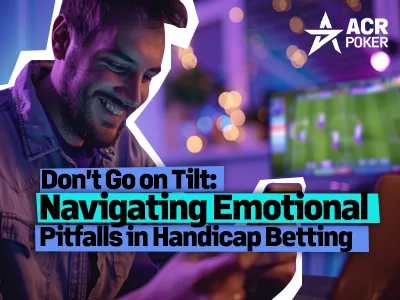Understanding the psychology behind betting can enhance one’s approach significantly. Recognizing and avoiding tilt in handicap betting are key aspects that every bettor should address to improve their outcomes. Tilt refers to a state of emotional frustration that can lead to irrational decision-making during betting. By implementing strategies focused on avoiding tilt betting, bettors can maintain a more controlled and analytical approach to their wagering activities.
Discovering How Recognizing and Avoiding Tilt in Handicap Betting Works
To grasp how recognizing and avoiding tilt in handicap betting works, one must first understand what causes tilt. Factors can include a series of losses, personal issues, or even the thrill of a win that leads to overconfidence. When in a state of tilt, bettors often make hasty decisions without a sound strategy. Recognizing the signs of tilt—such as feeling angry, frustrated, or overly excited—is crucial for effective betting.
Many bettors find themselves in this emotional state without realizing it. Keeping track of one’s mental state and recognizing the onset of these feelings is critical. Techniques such as self-reflection, meditation, or even taking a break can aid in neutralizing these emotions, allowing for better decision-making.
Benefiting from Strategies to Steer Clear of Tilt
To take advantage of the strategies for avoiding tilt betting, it’s essential to implement a disciplined betting framework. Here are some effective tips:
- Set a budget: Determine how much you are willing to lose before you start betting.
- Take breaks: If you feel emotions running high, step away from the betting process.
- Practice mindfulness: Engage in activities that ground you and promote calmness.
- Keep a betting journal: Document wins, losses, and emotional responses to identify patterns.
Implementing a Step-by-Step Strategy for Avoiding Tilt
Executing a strategy to avoid tilt in betting can significantly enhance your overall experience. Here’s a structured way to approach this:
- Self-assessment: Regularly evaluate your emotional state and readiness to place bets.
- Set clear goals: Define what you want to achieve with your betting activities.
- Evaluate your decisions post-bet: Analyze your decision-making process after each betting session to learn and improve.
- Create a contingency plan: Develop strategies for when you feel tilted, like taking a break or imposing a temporary betting freeze.
Avoiding Common Mistakes in Betting
Understanding the pitfalls in betting is crucial for avoiding tilt betting. Here are some common mistakes to steer clear of:
- Chasing losses: Continuously betting after losing to recover losses can lead you deeper into tilt.
- Ignoring bankroll management: Not adhering to a budget can quickly escalate emotions and lead to poor betting choices.
- Overvaluing short-term results: Letting recent outcomes heavily influence future bets can create a skewed perspective.
Exploring Real-Life Examples of Tilt in Betting
Many bettors encounter tilt in their betting journeys; exploring real-life scenarios can provide clarity:
| Situation | Tilt Reaction | Outcome |
|---|---|---|
| After losing several bets in a row, a bettor continues to wager in a frustrated state. | Makes impulsive bets on high-risk outcomes. | Ends up losing more money, further exacerbating the tilt. |
| A bettor celebrates a significant win, leading to overconfidence. | Increases bet sizes dramatically without strategic reasoning. | Suffers a series of losses, resulting in emotional distress. |
| After a personal conflict, a bettor uses wagering as an emotional outlet. | Loses touch with rational thinking and bets recklessly. | Faces substantial financial losses that contribute to household stress. |
Wrapping Up Thoughts on Avoiding Tilt Betting
By recognizing the signs of tilt and implementing strategies to avoid it, bettors can greatly enhance their betting experience. Maintaining emotional stability and employing disciplined decision-making are vital components in achieving success in handicap betting. The journey to mastering the art of betting is ongoing, and being mindful of one’s emotional state will ultimately lead to improved outcomes in the long run.



